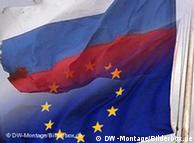International Relations | 31.05.2010
EU, Russia tackle energy and border issues amid economic crisis
European Union and Russian leaders began a two-day summit Monday in southern Russia where dialogue is expected to focus on visa rules, energy issues and the EU’s current economic woes.
Having long advocated for easier entry for its citizens into the EU, Russia plans to push EU leaders toward a draft agreement to cancel visa requirements, the ITAR-TASS news agency reported.
The Kremlin added that entry visas had a "destructive effect on all spheres of Russia-EU cooperation."
The EU, which is Russia’s biggest trade partner, appeared willing to make a deal before talks began in the southern city of Rostov-on-Don - but not without certain conditions. Brussels wants to see biometric passports for Russian citizens and stronger security along Russia’s southern borders before relaxing its visa requirements.
The EU also announced before the summit that it is keen to contribute money to anti-corruption initiatives and judiciary reform in Russia, although no figures were named.
Energy and economy
Energy will also dominate the agenda as talks get underway on Tuesday. The EU and Russia currently support competing pipeline projects Nabucco and South Stream, both of which plan to begin pumping gas to Europe.
The summit, held twice a year, will be overshadowed by the current economic crisis that is gripping several EU member-nations and has not escaped Russia’s attention.
"The EU is living in a critical moment in its history," Russian deputy foreign minister Alexander Grushko told reporters on Friday, adding, "We are closely watching how it strives to deal with the financial crisis."
New attitudes, new leadership
While the current economic situation in Europe is causing rifts between EU countries, tensions between the EU and Russia are expected to be calmer than at previous summits, which have been marked by squabbles over human rights abuses in Russia, gas deliveries and the 2008 war in Georgia.
This year expectations are high for productive talks at the summit, following Medvedev’s statement in April that Russia must show a "smiling" face to the world.
The twenty-fifth EU-Russia summit is the first to be held between Russian President Dmitry Medvedev and EU President Herman Van Rompuy whose position came into force last year under the Lisbon Treaty. Spanish Prime Minister Jose Luis Rodriguez Zapatero, whose currently holds EU’s rotating presidency, will be joined in Russia by European Commission chief Jose Manuel Barroso.
The EU is also expected to push Russia toward joining the World Trade Organization.
dl/AFP/AP/dpa
Editor: Kyle James /dw


No comments:
Post a Comment